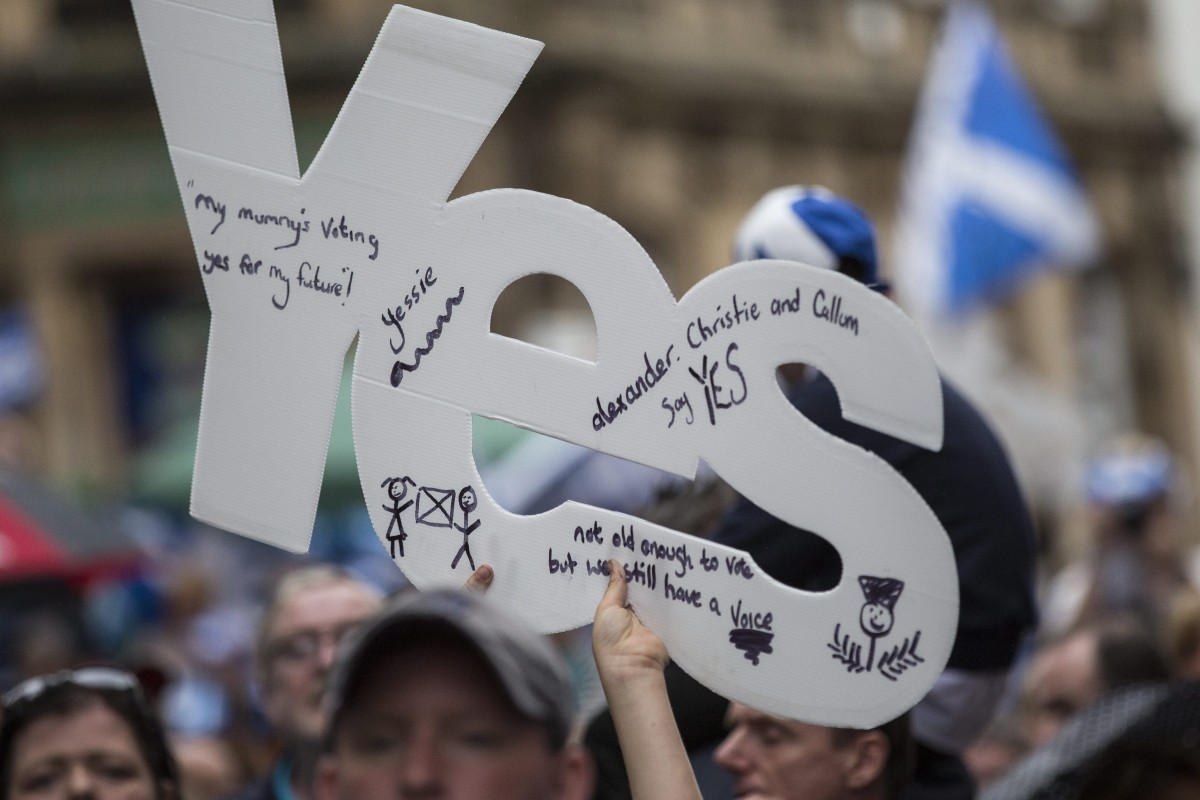
Journalists who mix with the rich and powerful are badly out of touch with the feelings of grass-roots voters and shamefully write bad things about any wish for change
 Supporters wait for Sottish First Minister Alex Salmond to arrive for the Vote Yes campaign in Stirling, Scotland.
Supporters wait for Sottish First Minister Alex Salmond to arrive for the Vote Yes campaign in Stirling, Scotland.Perhaps the most stunning fact about the Scottish referendum is this: that there is no newspaper – local, or national, English or Scottish – that supports independence except the Sunday Herald. The Scots who will vote yes have been almost without getting to talk about their views in the media.
There is nothing unusual about this. Change in any direction, except if it is about how a free market will solve everything and how Earth is being destroyed, goes against the views of a lot of opinon-journalists. What is different about the independence campaign is that it has continued to do well despite the negative press.
In the coverage of the referendum we see many things that are wrong with the “corporate media” – news companies who are in business for profit only. For instance, these writers will use general, unproven, descriptions when talking about lesser people.
In the Spectator, Simon Heffer writes that: “addicted to welfare ... Scots embraced the something for nothing society”, being against the poll tax “because many of them felt that paying taxes ought to be the responsibility of someone else”.
Here is the scorn with which the powerful have always treated those they think of as inferior: their serfs, the poor, the Irish, Africans, anyone with whom they disagree. “What spoilt, selfish, childlike fools those Scots are ... They simply don’t have a clue how lucky they are,” sneered Melanie Reid in The Times.
It seems these writers cannot tell the difference between a cause and a person. This vote has been painted as a vote about Alex Salmond, who is then made out to be a monster. (A Telegraph story compared him to Zimbabwean leader Robert Mugabe.)
A good example of the problem with the media is Dominic Lawson’s column for the Daily Mail last week. He began with Scotland, comparing the “threat” of independence with that presented by Hitler (the article was helpfully shown with a picture of Hitler.) Then he turned to the huge issue of how he almost wrote something incorrect about the very famous naturalist [Sir] David Attenborough, which was narrowly averted because “as it happens, last weekend we had staying with us another of the BBC’s great figures, its world affairs editor John Simpson”, who happily corrected Lawson’s mistake. This was just as well because “the next day I went to the Royal Albert Hall as one of a small number of guests invited by the Proms director for that night’s performance. And who should I see as soon as I entered the little room set aside for our group’s pre-concert drinks? Sir David Attenborough."Those who are supposed to hold power to account live in a small, very special world, moving among people as famous as themselves, the “small number of guests” who receive the most charming invitations.
In June the BBC’s economics editor, Robert Peston, complained that BBC news “is completely obsessed by the agenda set by newspapers ... If we think the Mail and Telegraph will lead [make this the big story on the page] with this, we should. It’s part of the culture.” This might help to explain why the BBC has attracted so many complaints of bias in favour of the no campaign.
Living within their tiny circle of light, most senior journalists seem unable to understand a wish for change. If they notice it at all, they think of it as a deadly threat, comparable perhaps to Hitler. They know as little of the lives of the 64 million people living the outer darkness as they do of the Andaman islanders. Yet, lecturing the poor from their own world, they claim to speak for the nation.
As John Harris reports in the Guardian, both north and south of the border “politics as usual suddenly seems so lost as to look completely absurd”. But to those within the circle, politics still begins and ends in London. The opinions of no one beyond the chosen thousand with whom they mix is worthy of notice. Throughout the years I’ve spent working with protest movements, one unchanging theme has emerged: most journalists are always among the last to understand that things have changed. It’s no wonder that the Scottish opinion polls took them by surprise.
One of the roles of the Guardian, which has no owner, is to represent the unrepresented – and it often does so to great effect. On Scottish independence I believe we have not done very well. Our leader on Saturday used the same ideas as rest of the press, focusing on a couple of things and sying they were a “habit” by yes campaigners of “attacking the messenger and ignoring the message”, judging the long-term future of the nation by this Scottish National Party policy, now, confusing the idea of deciding on one’s future, with the idea of being very patriotic.
If all the people in Britain’s government seem to be speaking with one voice, it is partly because the media demands it. Any party that challenges this worldview is cruelly disciplined. Any party that more noisily supports business power is praised.
For a moment, [newspaper baron] Rupert Murdoch appeared ready to offer one of his devillish bargains to the Scottish National party: my papers for your soul. That offer now seems to have been taken back, as he has decided that Salmond’s SNP is “not talking about independence, but more welfarism, expensive greenery, etc and passing sovereignty [power] to Brussels [the European Union]” and that it has to do things differently if it wants to be successful in future. It’s not a remark, it’s a warning: if you win independence and follow this plan, my newspapers will destroy you.
Despite the rise of social media, the established media still controls what people hear about politics in Britain, to shape political demands and to punish and get rid of those who resist. It is one chamber of the corrupt heart of Britain, pumping fear, misinformation and hatred around the body politic.
That so many Scots, scolded from all sides as fools, frauds and people who are ungrateful, have refused to be bullied is itself a political success. If they vote for independence, they will do so against what the British government wants, but also against those people who help to hold up that view: the distant, contented people who claim to speak on their behalf.
Click here to read the original article